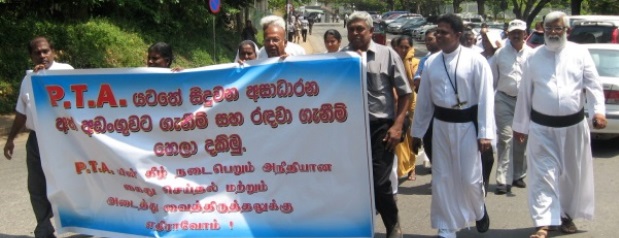by Easwaran Rutnam.
Office of the High Commissioner for Human Rights (OHCHR) has urged the government to review all cases of detainees held under the Prevention of Terrorism Act (PTA)
Moves to repeal draconian anti-terrorism laws are gathering pace as Sri Lanka prepares to provide an update to the UN Human Rights Council on the implementation of the resolution on Sri Lanka adopted by the Council this year.
Justice Minister Wijeydasa Rajapaksha told The Sunday Leader that a committee is in the process of closely studying the PTA and what law can be introduced to replace it.
He said that the committee consists of representatives from the office of the President, Prime Minister, Foreign Ministry and Justice Ministry.
The Minister also said that the Law Commission has also been requested to make recommendations on an alternative to the PTA.
However the Minister said that it was very unlikely the PTA will be repealed as early as next month.
The Office of the UN High Commissioner for Human Rights (OHCHR) had in September called on the government to initiate a high-level review of the Prevention of Terrorism Act and its regulations and the Public Security Ordinance Act with a view to their repeal and the formulation of a new national security framework fully compliant with international law.
The government then went one step further and co-sponsored a resolution at the UN Human Rights Council in September in which a commitment was given to “review the Public Security Ordinance Act and to review and repeal the Prevention of Terrorism Act, and to replace it with anti-terrorism legislation in accordance with contemporary international best practices”.
The government drew praise from the international community and human rights groups for the commitment made to repeal the PTA.
The New York based Human Rights Watch says now the government of Sri Lanka and the international community need to engage credibly, promptly and transparently to see these recommendations implemented. The Sri Lankan government, having asked for trust, needs to seize on this opportunity to deliver meaningful and expeditious justice and other reforms.
The HRW noted that the Sri Lankan government had accepted many recommendations to improve the human rights situation, including a repeal of the draconian Prevention of Terrorism Act and reforms to the Witness and Victim Protection Law, both long called for by victims’ rights groups.
OHCHR meanwhile had also urged the government to review all cases of detainees held under the Prevention of Terrorism Act and either release them or immediately bring them to trial and review the cases of those convicted under the Act and serving long sentences, particularly where convictions were based on confessions extracted under torture.
The government was accused of being slow to clarify the number and identity of detainees held under the Prevention of Terrorism Act and emergency regulations.
The Prevention of Terrorism Act has long provided a legal context for arbitrary detention, unfair trials and torture.
Section 2(1) (h) of the PTA was previously used to convict journalist J. S. Tissainayagam for his journalistic writing on alleged war crimes committed by government forces. According to local civil society sources, from January to August 2015, 19 people were arrested under the Act.
The Tamil Eelam Liberation Organisation (TELO) which has two members in Parliament, had decided not to back the 2016 budget during the third reading as Tamil political prisoners arrested under the PTA were not freed.
TELO leader, Parliamentarian Selvam Adaikalanathan had earlier informed this decision to Tamil National Alliance (TNA) leader R. Sampanthan.
TELO decided to take the position that all Tamil political prisoners arrested under the Prevention of Terrorism Act must be given a general amnesty.
The government had considered giving a general amnesty but did not proceed with move. The Campaign for Free and fair Election (CaFFE) believes that Sri Lanka can’t become a nation with a rule of law until the Prevention of Terrorism Act is abolished as it has the same suppressive powers of the Emergency Laws which were lifted in 2011.
Rajith Keerthi Tennakoon, the Executive Director of CaFFE said that the PTA effectively makes all the provisions of the International Covenant on Civil and Political Rights (ICCPR) invalid.
“What is more concerting is the fact that PTA has now become a part of Sri Lankan laws. While emergency laws had to be extended monthly, thus being easy to lift, abolishing the PTA needs more concerted efforts. In addition emergency laws can be convoked under the PTA, for example the PTA allows the ban of certain organisations and allows extended detention of persons,” he said.
After the January eight Presidential election was over, a number of Civil Society Organizations (CSO) from the North, especially those who deal with missing persons, called for the repeal of PTA. However CSOs from the South stated that it will be harmful for the electoral prospects of the government if they repeal the PTA right before a General Election.
When the former Deputy Mayor of CMC Azath Salley was arrested on May 2, 2013 by a team of officers from the Criminal Investigation Department (CID) and the Terrorism Investigation Department (TID), and placed under detention for further interrogation by the CID for 3 months under Section 2(1)(h) of the PTA, then Opposition Leader, Ranil Wickremesinghe accused the government of using the Prevention of Terrorism Act to suppress rival politicians and Opposition political parties.
The PTA was first enacted in 1979 as a temporary provision and it was amended by acts no 10 of 1982 and act no 22 of 1988. However this act was not able to prevent the July riots, put a quick end to the LTTE or prevent the JVP from taking up arms in 1987.
Sunday Leader
